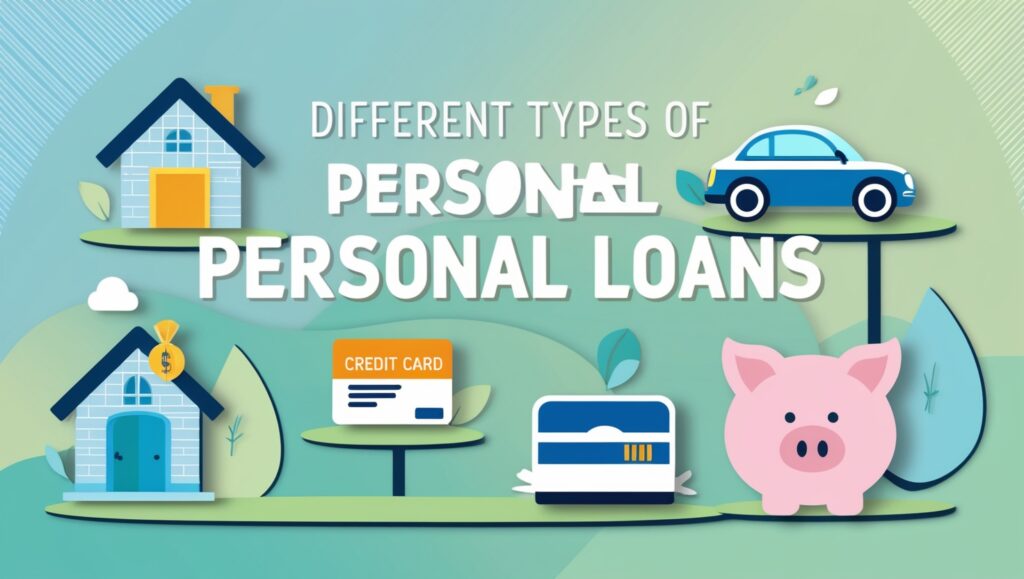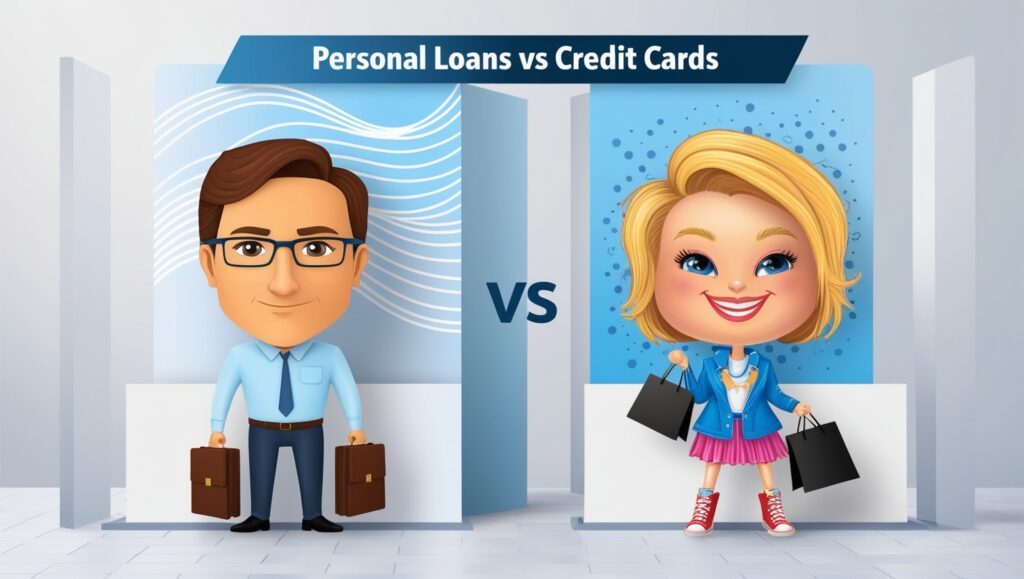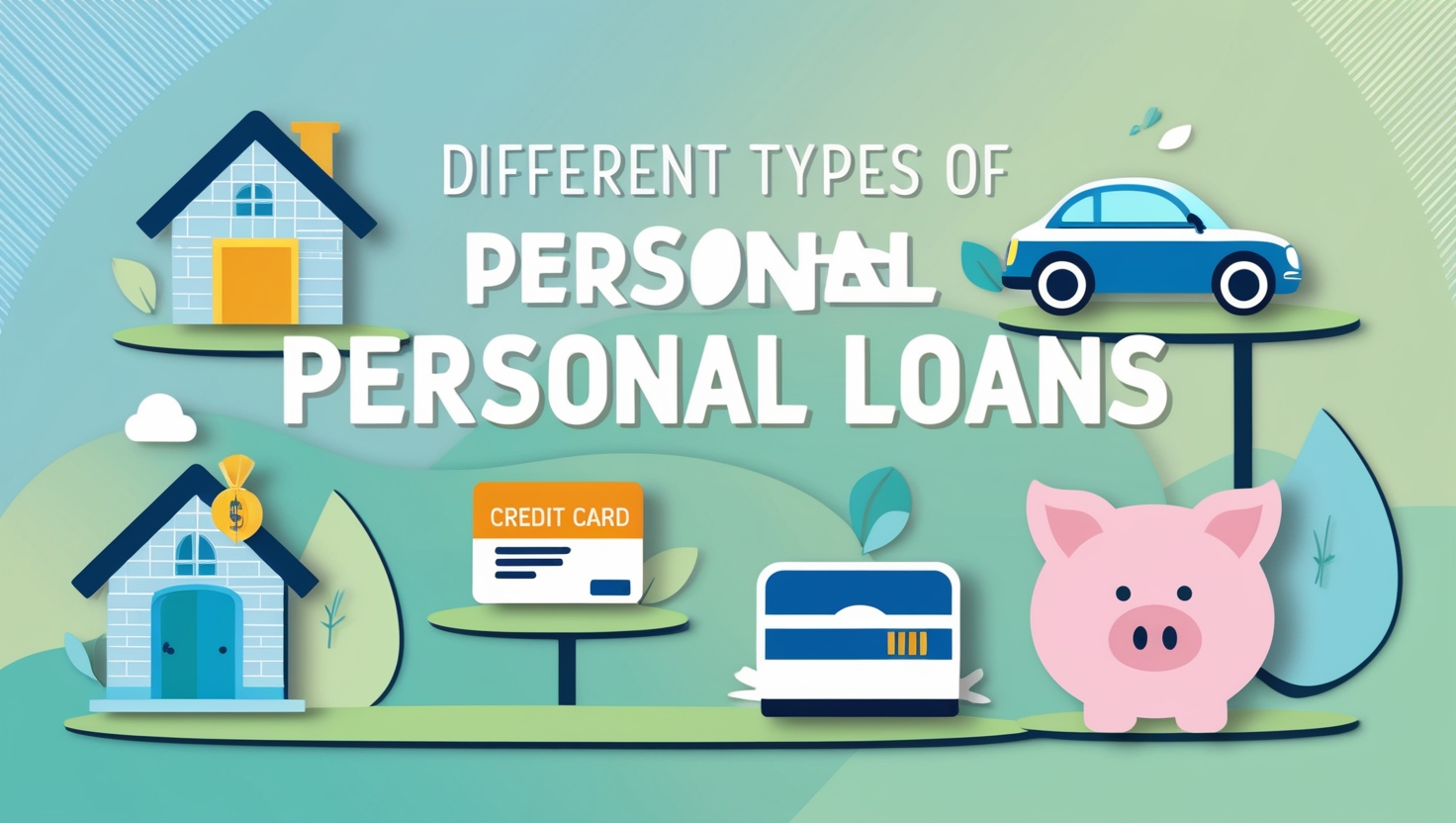Knowing what’s available to you is very important in managing your finances. Generally speaking, there are two primary options to borrow money: personal loans and credit cards. Both have features, both negative and positive, that may make one more suitable to another’s financial situation. In this comprehensive guide, we will be discussing the nuances of personal loans and credit cards so you can better decide which would be best for your needs.
What are personal loans?
A personal loan is an installment loan. They allow you to borrow a specific sum for a particular use. With personal loans, because they carry a fixed interest rate, you also know how long you will be paying it back, usually between two and seven years. You can apply personal loans towards anything from consolidating balances, medical procedure costs, home improvements, or simply buying something else.
Different Types of Personal Loans
- Secured Personal Loans: This is a type of loan that requires some form of collateral, which can be a car or savings account. Since they are secured with an asset, they have much lower interest rates.
- Collateral Free Personal Loans: As the name specifies, such types of loans don’t refer to any kind of collateral. Therefore, they carry higher interest rates than a secured one.


Advantages of Personal Loans
They carry a fixed rate of interest whereby an individual can predict his or her monthly pay regarding personal loans. This helps in budgeting, thereby financial planning.
One will have to pay back the whole lump sum of the amount taken while availing a personal loan. It is mainly helpful for big-ticket spends for which one needs immediate requirements.
- Disciplined Repayment: Personal loans help clients develop discipline in monetary management as with periodic/monthly instalments, they know exactly how much to pay every month.
- Low Interest Rates: The good news is that to those having good credit scores, the interest rates of personal loans may be lower than what credit cards can give them.
- Longer Re-payment periods Many personal loans have at least two to seven years of re-payment terms, so you’ll be able to pay out the burden of payments over time.
- Limited Ready Liquidity: After you have utilized a personal loan, it becomes rather challenging to obtain additional funds until and unless you apply for another loan.
- Impact on Credit Score: A new loan is likely to lead to a temporary loss of credit score due to the hard inquiry made by the lenders.
- Collateral Risk: Failure to repay a secured personal loan can result in further serious implications in respect of losing the asset that has been pledged as security.
Understanding Credit Cards
What are Credit Cards?
A credit card is a type of revolving line of credit that allows you to borrow cash up to a specific limit. Credit cards can be used for everyday expenses, emergencies, or even buying big-ticket items. Unlike personal loans, there is no one-time delivery of a lump sum. Credit is advanced as you spend it within your credit limit. You can pay full balance due or make minimum monthly payments.


- Standard Credit Cards: These are the cards with revolving credit lines and no rewards or specific benefits.
- Reward Credit Cards: Such cards will give you reward, cash back, or points for every dollar of spending. Maintaining the balance is to your advantage if you can since the credit has rewards. If you pay off the balance every month, then you ought to be a reward card user.
- Secured Credit Cards: These are available for those with bad credit. You will need to deposit some cash, and the cash deposited will be your credit limit.
- Balance Transfer Credit Cards: They offer lower interest rates in case you want to transfer the balance from other credit cards, thereby saving a lot on interest.
Advantages of Credit Cards
- You can use them to borrow money when you need to, which makes them perfect for unpredictable spending needs.
- With credit cards, you earn cashback, points, or travel miles above and beyond what you spent on it.
- Introductory Period Deals: Some credit cards offer 0% APR for an introductory period during which you can use to make purchases followed by repayment without going through interest charges.
- Rebuilding Credit: The responsible use of a credit card, particularly with respect to on-time payments and low balances, will put you back on the right track with regard to your credit score in the long run.
- Emergency Funds: Credit cards provide short-and-direct access to some funds in case of an emergency.
Benefits of Credit Cards:
- High Interest Rates: There are high interest rates when one carries over a balance from month to month with their credit card.
- Accumulation of Debt: With the revolving nature of this type of credit, it is very easy to spend more than you have, which can quickly build up important debt if you do not pay close attention to your spending.
- Trap of Minimum Payment: Paying only the minimum when due may not feel like much at first, but it will ensure a relatively long time to repay your loan and may add up significantly in terms of interest costs.
- Fees: Credit cards have annual fees, late fee charges, and others that can simply accumulate really fast.
Personal Loans vs Credit Cards
1. Need to Borrow
- Personal Loans: For bigger, more infrequent expenditures; for example, home repairs, medical expenses, or debt consolidation. You need some amount to spend on a specific something. The personal loan will thus be better suited.
Credit Cards are useful for only occasional, small-ticket purchases or surprise expenses. If you will need a little flexibility with borrowing and pay off the balance in a short period of time, credit cards likely make more sense.


- Interest Rates
Personal Loans typically have fixed interest rates that are even lower. So, they are usually cheaper for large amounts.
Credit Cards generally come with much higher interest rates, which makes it much more expensive to carry any type of balance.
- Repayment Structure
Personal Loans The fixed monthly repayment makes budgeting much simpler as well as a known time until the loan will be paid off
Credit Cards Payments are flexible, but there is always the risk of costly interest when payments aren’t made in full
- Availability
Personal Loans The amount is issued all at once. This is less practical for continuing expenses.
Credit Cards There is always access to additional available credit. This is a very flexible way to spend money. - Effects on Credit Score
- Personal Loans: They might instantly push your credit score down due to rising debt, but in the long run, if handled wisely, they are beneficial.
- Credit Cards: Proper usage of a credit card fetches you better credit scores, while higher balances may not be exactly good for your credit scores
When to Use Personal Loans
- Debt Consolidation: You have too much-high-interest credit card debt and want to consolidate it into a personal loan with a lower interest rate to save some money.
Large Purchases-If you have large purchases to be financed immediately, for example renovations of a home or other expensive medical bills, personal loans can be a more structured approach.
Long-term Needs: If you need a longer repayment term with fixed payments for better budgeting, then the personal loan is the way to go.
When to Use Credit Cards
- Everyday Expenses: You spend only once a month and are responsible enough to pay off the balance so that no interest is charged.
- Reward Programs: You receive rewards, cash back, or travel points besides managing your spending.
- Emergency: Credit cards help in easily getting money in emergency situations without going through the long application process.
Combining Personal Loans and Credit Cards
Sometimes, strategically using both personal loans and credit cards does make complete sense. For instance, you can use a credit card for everyday use while consolidating the high-interest debts using a personal loan. This combination helps an individual manage his cash flow efficiently without incurring high interest costs.
Conclusion
The biggest choice lies in whether to take a personal loan or a credit card. The choice will depend on the specific needs and goals you have along with your own financial habits. A personal loan is best suited for significant, one-time expenditures and comes with a more predictable repayment schedule. Credit cards are perfect for daily expenses and emergencies- pretty much any expense at all, really.
Before making that loan or credit product decision, keep in mind your financial state, how you think you will need to use the money, and your ability to repay responsibly. Be sure also to read the fine print and take in terms associated with the loan or credit product you are considering before making the commitment. Conclusion An informed choice will help you achieve your financial goals without increasing the cost of borrowing.
